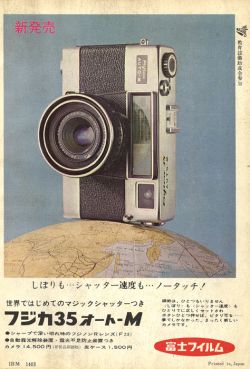 This ad for Fujifilm’s Fujica 35 Auto-M is from the back cover of the April, 1962 issue of Asahi Camera, and was “on sale now” as the red lettering says in the top left corner. The tag line plays up its magical quality by telling us “You don’t need to touch either the aperture ring or the shutter speed dial.” (Literally, “The aperture, as well as the shutter — No Touch!”). There’s probably a good reason why they balanced the camera vertically on the globe, rather than the more logical horizontal placement, but I don’t quite get it. It does make the ad more interesting though.
This ad for Fujifilm’s Fujica 35 Auto-M is from the back cover of the April, 1962 issue of Asahi Camera, and was “on sale now” as the red lettering says in the top left corner. The tag line plays up its magical quality by telling us “You don’t need to touch either the aperture ring or the shutter speed dial.” (Literally, “The aperture, as well as the shutter — No Touch!”). There’s probably a good reason why they balanced the camera vertically on the globe, rather than the more logical horizontal placement, but I don’t quite get it. It does make the ad more interesting though.
Presumably the M stands for “magic” and comes as a result of the Copal Magic B shutter the camera employed, although Copal isn’t mentioned by name in the ad — unlike an ad for Copal in the same magazine, which features a picture of hands assembling a shutter and lens and the caption indicating that the camera in the photo is this same Fujica 35 Auto-M. The Fujifilm ad refers to the Auto-M as the world’s first camera to come with the “magic” shutter.
The text of the copy (more or less) reads “You don’t need to make any adjustments. Both the aperture and shutter speed are chosen automatically so that when you press the shutter button, you get a perfect exposure. In the past this functionality was only a dream, but this is a completely brand new camera.”
Among the Fujica line of fixed-lens rangefinders — there were about seven different models released between 1957 and 1967 — the Auto-M was unusual in that it didn’t have a focusing thumb-wheel at the back of the topcover (an interesting quirk of the Fujica rangefinders that can be seen here on the 35M model). The lens on these was a Fujinon-R 47mm that opened to F2.8 (the text says something lost in the translation about the lens having a sharpness that cuts deep).
The 35 Auto-M listed for ¥14,500 plus ¥1,500 for a leather case. That would have been about $40 US Dollars at the exchange rate of the day. Buying such a camera in Japan today would cost about ¥70,000 if we look at the relative value of the yen. Needless to say, one of these in today’s used market won’t set you back nearly as much.
Elsewhere on the web
There’s not too much specific to this camera out there, but these might be worth a look:
Murakami-san’s “As Is” review (in Japanese, with a few sample shots)
Japan Family Camera (Japanese; see this page for more (!) Fujica cameras)
Sylvain Halgand’s Auto-M page (in French; scroll down page for more Fujicas)
Chris Eve’s old Fujica site (now defunct, but available via the Wayback Machine; see this page for non-SLR Fujicas)